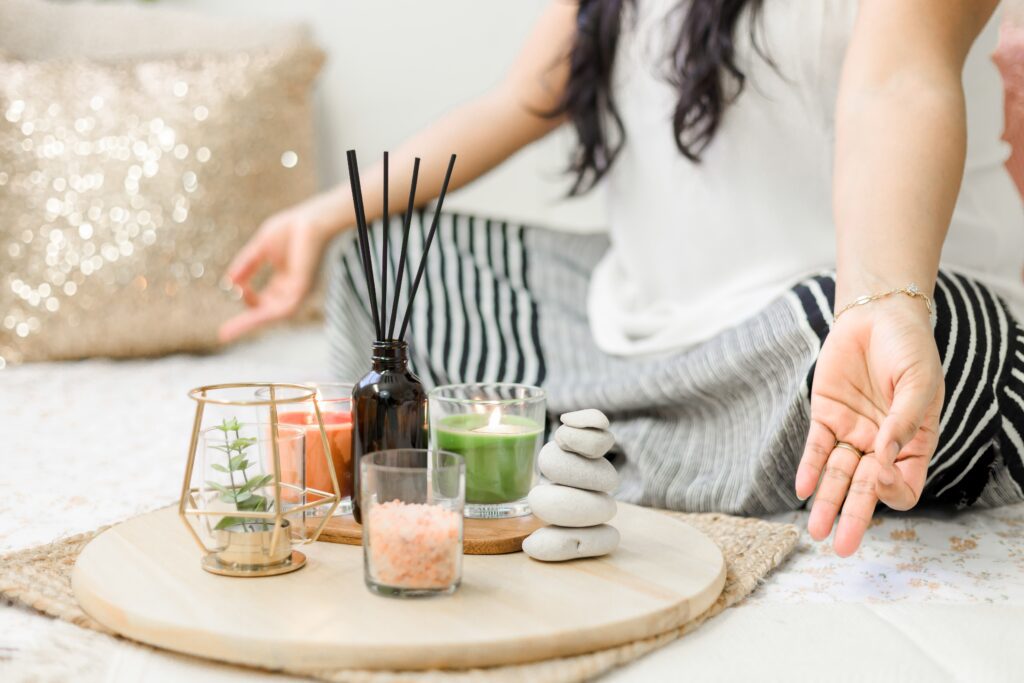Ever felt like a sponge, soaking up everyone’s drama, complaints, and problems until you’re so saturated you can’t even absorb your own thoughts?
The absence of personal boundaries can blur the line between these issues and your personal space. Without setting them your emotions are like a waterlogged mop making you wobble around, unabling your function properly because you are carrying the weight of others’ drama.
When you set boundaries it conveys a powerful message about what your limit of involvement is in their affairs, what your values are, and what you refuse to compromise for your mental stability, to ensure that your personal space, values, and needs are honored.
These personal boundaries stand as a cornerstone that nurtures a healthy relationship with oneself and others. Without them, you risk being overwhelmed, drained, and disconnected from yourself.
They can help you maintain a safe balance where you can recharge, and create a safe space for personal growth, and emotional healing. This intentional separation from external pressures and negativity fosters a sense of inner peace and resilience.
Why Is Establishing Personal Boundaries So Important?
Your personal boundaries are invisible fences that define what aligns with you regarding behavior, treatment, and expectations.
By setting and enforcing boundaries, you can clearly state to yourself and others that your own needs and feelings are valid and should be respected as well.
They act as a guideline for how you wish to be regarded and extend the same treatment to others, ultimately safeguarding your emotional and mental well-being. This act of self-advocacy is fundamental for your emotional well-being.
1. Enhances Emotional Stability
Building personal boundaries creates a framework within which we function and nurture our well-being.
It helps us clearly define our limits, where we stand, and what we will or will not tolerate, fostering a deep sense of control over our lives. This clarity reduces uncertainty as you become better equipped to manage difficult situations and interactions.
2. Helps Prevent Burnout
Without limits, we tend to take on too many tasks than we can handle, mainly out of obligation or reluctance to refuse someone’s request, consistently trying to fulfill other’s standards at the expense of our well-being.
When you set clear boundaries, you liberate yourself from this restless pace that can diminish your resilience and lead to physical and emotional exhaustion. You can then take out time for rest and recharge without overextending yourself.
Image Credit to Annie Sratt on Unsplash
3. Protects You From Emotional Vampires
Few people are like emotional vampires who tend to suck on the emotional energy of those around them.
These people continually complain, seek attention and validation, always seeing the downside in situations and people.
Their negativity and constant venting can be emotionally exhausting and depleting for those in their vicinity.
Creating a boundary and standing firm on it around these people halts them from advancing in their manipulation and safeguarding your emotional well-being. It also supports you to step up with cultivating relationships that are mutually supportive and nourishing.
4. Protects You From Toxic Relation and Situations
Whether it’s a friend who always dumps their problems on you or a work environment that demands too much from you, this form of relationship often creates undue stress and emotional drain.
An unhealthy relationship is marked by manipulation, disrespect, and negativity. When you are invested in such involvement, it can diminish your self-belief and inner calm.
Communicating your boundaries lets you recognize and avoid toxic interactions before they take root. These boundaries don’t build walls but create gates that you can control, opening yourself up to kindness and closing to toxicity.
Maintaining personal boundaries clearly expresses where your limit lies and empowers you to step away from an environment that causes damage and seek space where you are valued.
5. Boosts Your Self-Esteem
When you value yourself enough to draw personal boundaries, it reflects the deep respect for your needs and values, which highlights that you prioritize your well-being.
Defining your personal space helps you gain a sense of control and create a supportive environment where you can thrive and foster a sense of confidence. This enhances your self-esteem and teaches others how they should approach you, promoting a more respectful and healthier relationship.
7 Personal Boundaries to Build to Protect Your Emotional and Mental Health
1. Set Limits on Sharing Personal Information
Have you ever noticed that sharing your personal details with someone can leave you feeling drained or even anxious?
We often share our innate thoughts, fears, and struggles with family and friends to lose the mental load we feel upon any conflicting situation or concept. Yet, in this culture of openness, the thought of seeking validation and hope of being understood and accepted remains ever elusive.
Our thoughts and experiences are often deeply personal. When we share ourselves this way, we invest ourselves too much emotionally. Each disclosure leaves you vulnerable and subject to other people’s interpretation, judgment, and exploitation.
When you set a limit over sharing your personal information, you respect your privacy. It empowers you to trust your judgment without the dependency on external validation and advice.
But drawing the lines over the information you share with others, whether deliberate or casual, is not about building walls, but it is an act of preservation. It is about respecting our vulnerabilities and safeguarding our emotional and mental health like our physical well-being.
So, next time the impulse to share strikes, keep it light. It is okay to let in someone you feel comfortable with but save the deep dives for your diary or for someone you trust.
2. Protect Your Time from Emotionally Draining Activities and People
Daily, we manage numerous duties, and it’s all too common to find ourselves swapped with texting tasks and interactions that sap our energy.
Emotionally draining elements like excessive social media use, the weight of unnecessary obligation, or the relentless pressure of unproductive tasks can diminish our potential to nurture our needs.
Similarly, the ceaseless demands of toxic relationships, engaging in conflicts, and interacting with individuals who are constantly negative and demanding can chip away at our mental resilience. Allowing yourself to be consumed by such drains can leave you with little left for the things and people that truly matter.
By recognizing and setting boundaries, you can protect your time by balancing and making conscious choices about prioritizing activities, simply taking moments for yourself and the people who uplift you.
This doesn’t mean that you are cutting people out or everything challenging but rather stepping back when you need to prioritize your well-being and create space for mental and emotional reserves.
3. Be Mindful of How Much Emotionally Available You Are to Others
Being mindful of your emotional availability means knowing your limits and honoring them.
Our emotional availability is an invaluable resource, one that quickly depletes if given without intent and awareness.
When we extend ourselves too freely and constantly, it drains our emotional energy without replenishing it which can easily disrupt our emotional reserve. This unchecked generosity can lead to an unbalance where we find ourselves pouring from an empty cup, unable to nurture our own spirit.
While being there for your friends and family when in need is important, constantly putting their needs above your own can wear you out and overburden you. When you create a balance between giving in to the emotional demands of others and taking care of yourself, you preserve your mental health.
Remember that your ability to support others is directly tied to how well you take care of yourself. It’s perfectly fine to choose to say no, take a rain check, or just simply run for the hills.
You have every right to safeguard and maintain your emotional well-being, ensuring you are genuinely present when you choose to be available.
Image Credit to Mathilde Langevin on Unsplash
4. Respect and Maintain a Healthy Emotional and Physical Space You Need
Ever had someone hover around you so much that you considered buying a personal bubble suit?
Your personal space is more than just Marie Kondo-ing your life. It is about giving yourself an emotional and physical space where you can acknowledge your own need to feel balanced and content.
This means saying no to that one friend who thinks your free time is their personal venting hour or sending unwanted calls straight to voicemail.
When you give yourself emotional space you acknowledge that you don’t always have to be available for others. Setting boundaries ensures you have the emotional energy to take care of yourself first.
This forms a strong foundation for emotional and mental resilience, providing you with the tools to navigate life challenges with more confidence.
Maintaining and respecting your personal boundaries is also considered a form of self-respect and self-love that sends a powerful message to yourself and others to prioritize their well-being. It prompts us to value our needs and create an atmosphere where internal and external needs are supported and nurtured.
5. Learn to Say No to Requests That Overwhelm You
Saying “no” can be a real struggle sometimes. We all have been there—nodding eagerly to take on yet another project as our brains are waving red flags and screaming, “Pull out now!”
But here is the thing—every time you commit to things you have no wish to send your stress level into overdrive, driving your mental health to take a downward turn. Heads up: it’s not going to end well.
Every request you accept carries an emotional burden, and when these requests pile up, they can become an intolerable strain.
It is important to shield your emotional and mental health by not falling into the trap of pleasing everyone to avoid staying in constant stress and a perpetual state of overwhelm.
Setting boundaries over doing things that exceed your capacity is a deeply personal affirmation of our right to protect your inner peace and maintain balance.
Declining requests allow you to regain control of your time and energy, ensuring that you do not stretch yourself too thin and prioritize your needs and limits.
Image Credit to Saeed Karimi
6. Distance Yourself from Conversation That Involves Gossip, Negativity and Emotional Manipulation
Distancing yourself from conversation steeped in gossip, negativity or emotional manipulation is a powerful act of maintaining personal boundaries and self-preservation.
Engaging in negative exchange whether in the form of a guilt trip, passive-aggressive dips, or being knee-deep in a vortex of complaints, is like quicksand for our emotional health. At first, it may seem harmless until it traps you in a web of speculation and judgment.
Refusing to participate in such practices shields you from absorbing unnecessary stress and mental pitfalls, shifting your focus to more meaningful and constructive topics that can enhance personal growth and foster genuine connection.
7. Make Self-Care a Non-negotiable Part of Your Routine
Self-care extends beyond mere indulgence; it is about nurturing yourself from the inside out—mind, body, and soul.
Setting self-care as a boundary teaches us to value and respect ourselves enough to honor our needs and happiness. It expresses that we deserve time and space to heal, reflect, and glow.
Our daily life demands carry their own set of stresses. These accumulated strains can manifest in various ways—burnout, emotional exhaustion, anxiety, irritability, and a reduced resilience to cope with life’s challenges.
Scheduling a self-healing time as a non-negotiable part of your day acts as self-preservation, a foundation on which our health rests. Taking time to fill yourself up regularly can replenish your emotional reserves and renew your spirit.
So even if it means wearing a face mask that makes you look like a serial killer for 20 minutes straight, then follow your bliss.
Know Your Limits
Our personal boundaries function as a moral compass, leading you toward authenticity and fulfillment. They equip you to manage your relationships with clarity and integrity, nurturing mutual respect and understanding.
Establishing and maintaining these boundaries isn’t only about self-preservation; it is a shield that safeguards you in your profound journey toward cultivating a healthy relationship with yourself. They teach the invaluable lesson that mental and emotional well-being begins with respecting your limits and priorities.





